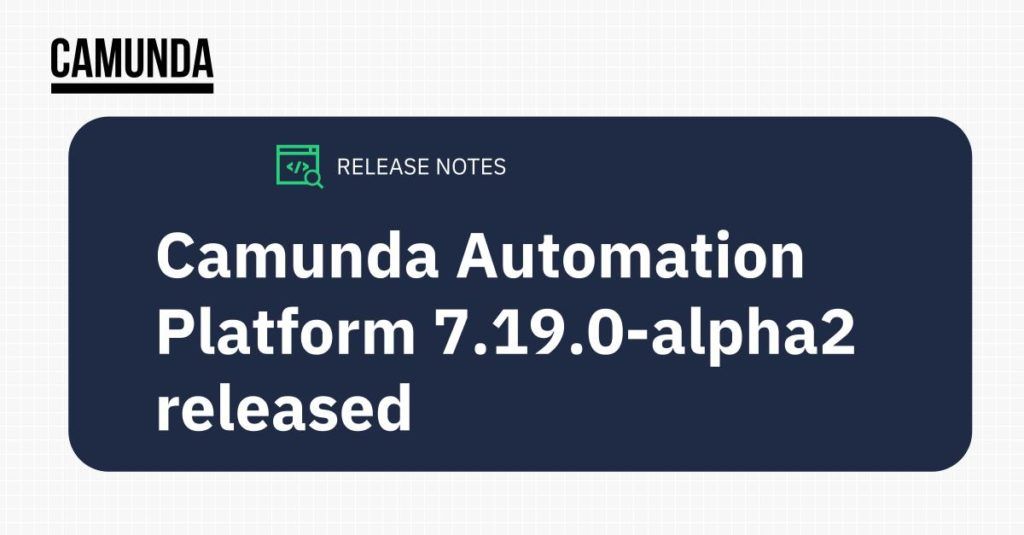We are pleased to announce the next alpha release of Camunda Automation Platform 7.19. This release features the following improvements:
- New REST documentation
- Diagnostic data contains data collection timeframe
- LDAP Identity Plugin: Support for pagination
- Assert: Support for completing External Tasks with local variables
- Support for PostgreSQL 15
- 5 Bug Fixes (opens GitHub link)
You can Download Camunda for free or Run it with Docker.
For a complete list of all improvements, take a look at the release notes. Please also see the list of known issues.
If you want to dig in deeper, you can find the source code on GitHub.
New REST documentation
The REST documentation is a central part of docs.camunda.org. Like the rest of the documentation pages it is written in markdown by hand and grew over time. With 7.13.0 we also introduced an OpenAPI specification which describes the REST API on a technical level and allows you to generate clients that connect to it. Since then, the two lived next to each other and were maintained individually.
During the last internal innovation week, where the team chooses tasks to work on that are usually not part of the product roadmap, two of our engineers worked together to use the OpenAPI specification to generate the UI for the REST documentation. The result was released with this alpha release and replaces the old documentation.
Check out the new UI at https://docs.camunda.org/rest/camunda-bpm-platform/7.19-SNAPSHOT/
Note: The new UI was only introduced on the 7.19 branch and will be used on future version branches. Older versions keep using the old pages.
Diagnostic data contains data collection timeframe
Telemetry data contains useful information about the Camunda installation and its environment (e.g., Camunda version, vendor name and version of the database, the application server or the JRE).
It also contains dynamic data and usage statistics information collected over time (e.g., number of started process instances, number of executed commands).
There are several events that will trigger a reset of those dynamically collected metrics (e.g., enabling sending telemetry data to Camunda or engine startup). The current release will add a timestamp to the telemetry data which indicates the start of the data collection (i.e. when the dynamic data was reset).
The response JSON structure looks like this (for a detailed example check out the new REST docs.
{
<...>,
"product": {
<...>,
"data-collection-start-date": "yyy-mm-ddThh:mm:ss.SSSZ"
<...>
}
<...>
}LDAP Identity Plugin: Support for pagination
Some LDAP Servers are configured by default to return a maximum amount of results (e.g., 1000) to manage the load. Previously, the LDAP Identity Plugin didn’t support pagination according to RFC 2696, so it was impossible to see all users or groups in the Admin Webapp.
This release features support for pagination for the LDAP Plugin. Pagination is disabled by default, but you can enable it with the help of the plugin configuration property pageSize. You can read more about it in our documentation.
This feature was contributed by one of our consultants Pierre-Yves Monnet. Thank you for your contribution!
Assert: Support for completing External Tasks with local variables
Assert is a Java testing library for Camunda Automation Platform 7.
For testing purposes, you can use a helper method to complete External Tasks. While previously it was only possible to complete External Tasks without variables or by providing process variables, with this release, we introduce support for completing External Tasks with local variables.
Here you can find an example how to use the new test helper:
@Test
@Deployment(resources = { "my-process.bpmn" })
public void shouldCompleteExternalTask() {
// Given
ProcessInstance pi = runtimeService().startProcessInstanceByKey("my-external-task-process");
ExternalTask externalTask = externalTaskQuery().singleResult();
// When
complete(externalTask,
withVariables("my-process-variable", "my-value"),
withVariables("my-local-variable", "my-value"));
// Then
assertThat(pi).variables().containsKey("my-process-variable");
assertThat(pi).variables().doesNotContainKey("my-local-variable");
}This feature was contributed by our community user @nesies. Thank you for your contribution!
Support for PostgreSQL 15
This release adds PostgreSQL 15 to the list of supported databases.
Share Your Thoughts with Us!
Your feedback is really important to us, so please download Camunda Platform Runtime 7.19.0-alpha2, try it out, and let us know what you think about it.
You can contact us in the forum, send a tweet to @Camunda, or file a bug in our issue tracker.

